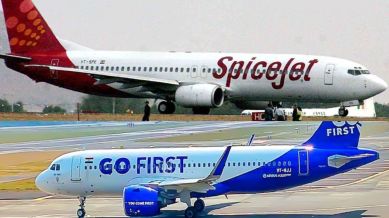Bankrupt carrier Go First, which is undergoing the corporate insolvency resolution process (CIRP), has received two bids—a joint offer by SpiceJet’s chairman and managing director Ajay Singh and little-known entity Busy Bee Airways, and the other by United Arab Emirates-based aviation company Sky One.
Singh submitted the bid with Busy Bee Airways in his personal capacity and SpiceJet’s role, if the bid is successful, would be that of an operating partner, which would entail providing essential staff, services, and industry expertise. According to Registrar of Companies records, Busy Bee Airways is a Delhi-based company that was incorporated in 2017. The records show that the company currently has two directors, both of whom were appointed on December 25, around a week after SpiceJet expressed interest in bidding for Go First.
Confirming Sky One’s bid, its chairman Jaideep Mirchandani said, “We have submitted the bid for Go First and look forward to the next stage, which is due diligence. Given our vast aviation experience across the globe, we are confident about the acquisition. Indian aviation is at the cusp of unprecedented growth and we are glad to play a part in it.”
Budget airline SpiceJet is itself grappling with financial difficulties. The airline is currently implementing a revival plan, having recently completed the first tranche of capital infusion amounting to Rs 744 crore, with additional subscriptions pending regulatory approval. The company has also initiated the process to raise an additional Rs 1,000 crore. SpiceJet already holds shareholder approvals to raise up to Rs 2500 crore through the qualified institutional placement (QIP) route.
“This collaboration is anticipated to generate synergies between the two carriers, leading to improved cost management, revenue growth, and a strengthened market position within the Indian aviation industry. For SpiceJet, serving as the service provider presents significant opportunities for revenue expansion. By leveraging its established infrastructure and operational capabilities, SpiceJet can optimize resource allocation and achieve cost efficiencies across various functions, including maintenance, ground handling, and engineering,” SpiceJet said.
According to SpiceJet, coordinated route planning initiatives are likely to enhance passenger traffic and drive ticket sales for both the carriers.
“I firmly believe that GoFirst holds immense potential and can be revitalized to work in close synergy with SpiceJet, benefiting both carriers. Apart from coveted slots at domestic and international airports, international traffic rights, and an order for over 100 Airbus Neo planes, GoFirst is a trusted and valued brand among flyers,” Singh said.
Story continues below this ad
It is worth noting that SpiceJet itself has been struggling financially for some time now, and has been embroiled in legal tussles with creditors and aircraft lessors. All this has reportedly impacted operations and the airline has been forced to delay salaries on multiple occasions. Apart from the latest decision to raise fresh equity, the airline had converted over $100 million of lease rental dues into equity for aircraft lessor Carlyle Aviation.
Apart from SpiceJet and Sky One, Africa-focussed investment firm Safrik had also expressed interest in bidding for Go First in December. It is not clear if Safrik has gone ahead and submitted a bid for Go First. Earlier, while Jindal Power and Jettwings Airways had submitted expressions of interest (EoI) in acquiring Go First, they did not finally bid for the Wadia group airline, after which lenders were contemplating liquidation of Go First.
Cash-strapped Go First announced on May 2 that it was filing for voluntary insolvency proceedings with the National Company Law Tribunal (NCLT), blaming engine manufacturer Pratt & Whitney (P&W) for the financial crisis. The airline said that it was “forced to apply to the NCLT” after “the ever-increasing number of failing engines supplied by Pratt & Whitney’s International Aero Engines” led to the grounding of 25 aircraft, or half its fleet of Airbus A320neo planes, and significant financial stress. Go First cancelled all its flights starting May 3 and has not resumed operations yet.
In its initial filing with the NCLT, Go First said that it owed Rs 6,521 crore to financial creditors, which include Central Bank of India, Bank of Baroda, IDBI Bank, and Deutsche Bank. While the carrier had not defaulted on its dues till April 30, it informed the NCLT that given its current financial position, defaults would be “imminent”. The carrier did, however, default on payments to operational creditors, including Rs 1,202 crore to vendors and Rs 2,660 crore to aircraft lessors.
